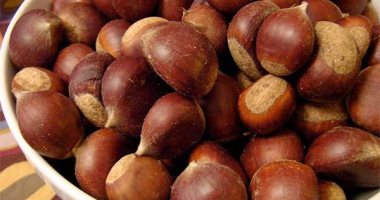Eating nuts are known from chestnut plants and shrubs known as “Abu Farwa” that they are highly adaptive, and have a delicious taste, and can be used in a large group of recipes, as it is a source rich in dietary fiber, and it is known that the fibers help reduce cholesterol levels in the blood.
It is a source of unsaturated fats useful to promote heart health, and the nutritionist Lofnett Patra confirmed that roasted chestnut is one of the most favorite foods during the winter season, for its many health benefits, according to the “NDTV” website.
4 health reasons for eating Abu Farwa
The “Abu Farwa” chestnut contains gallic acid and elagic acid, which may help in managing blood sugar levels and may improve insulin sensitivity, which makes your cells more responsive to insulin, in addition to that chestnut is a good source of fibers that can help prevent high sugar levels in the blood.
Chestnut contains properties that may help reduce inflammation, and antioxidants in chestnuts such as vitamin C, gallic acid, elagic acid and various polyphenols can help reduce inflammation, and work to neutralize free radicals, which are one of the main engines of chronic infections.
Chestnut is a great source of fiber that supports the function of the digestive system, and the fibers also act as vital materials, nourishing the bacteria of the intestine and in turn in preserving a healthy environment for the intestine.
Being a source of polyphenols such as gallic acid and elagic acid may help chestnut to protect the heart from oxidative stress, and chestnut is also a good source of potassium, which is important for regulating blood pressure, adding chestnut to your diet to gain many health benefits..

